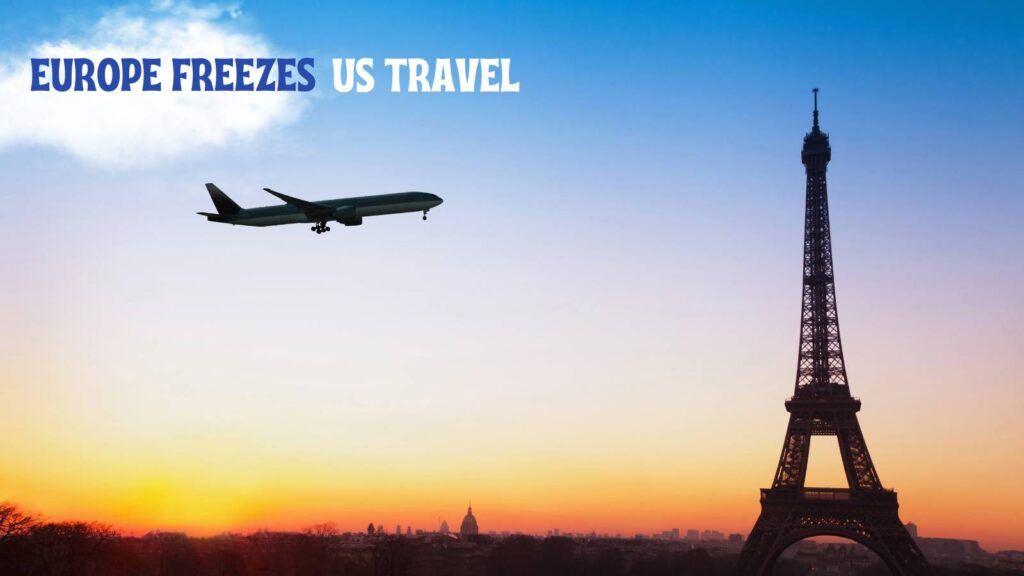Announcement that Europe freezes US travel comes at a critical moment, just before the peak summer holiday season when millions of Americans traditionally travel across the Atlantic. European destinations such as France, Italy, Spain, and Germany have consistently ranked among the most popular for U.S. tourists, attracting travelers for cultural events, summer festivals, and historical sightseeing.
The new restrictions and advisories issued by several European governments have created uncertainty that is directly affecting tourism industries on both sides.
For many American families, students, and business travelers, the sudden changes raise questions about whether their summer plans can proceed smoothly. Travel agencies are already reporting increased inquiries from concerned customers, airlines are re-evaluating schedules, and hotels in major European cities are preparing for reduced American bookings.
This development not only impacts individual travelers but also the broader global tourism sector, which has long relied on the steady flow of U.S. visitors to Europe.
What Does “Europe Freezes US Travel” Really Mean?
The phrase “Europe freezes US travel” does not indicate a complete suspension of flights or a total travel ban. Instead, it refers to a series of coordinated advisories and restrictions by European nations aimed at limiting or scrutinizing entry for U.S. citizens.
These measures include stricter immigration checks, heightened questioning at border points, and in some cases, official travel warnings advising European citizens to reconsider visiting the United States.
From the American perspective, this means that although flights are still operational, travelers may encounter more complicated procedures upon arrival. Reports from European airports highlight longer queues at immigration counters and an increase in the number of travelers being detained for secondary checks.
While official documents such as passports, visas, or ESTA approvals remain valid, they no longer guarantee swift entry without complications. The freeze represents a shift in how Europe is handling transatlantic travel, prioritizing security and political considerations over tourism flow.
The New Rules Behind the Freeze
The driving force behind the freeze is a set of new immigration and security rules introduced across several European nations. Authorities have emphasized that valid travel documents alone may not ensure entry and that border agents have been instructed to apply stricter verification processes.
One of the most notable developments is the clarification that a valid visa does not automatically guarantee entry, leaving decisions more firmly at the discretion of border control officers.
European advisories have raised concerns for specific groups of travelers. Warnings have been issued regarding increased risks faced by LGBTQ+ tourists and individuals from minority backgrounds, with reports citing instances of detentions, questioning, and delays during immigration checks.
These rules appear to be linked to broader concerns over U.S. immigration policies and reciprocal actions between the United States and Europe. The measures demonstrate how political and social issues are influencing cross-border mobility in ways that directly affect ordinary travelers.
Impact on Summer Vacation Plans
The freeze is expected to significantly disrupt traditional travel patterns during the summer of 2025. Airlines such as Lufthansa, British Airways, Air France, and KLM have already adjusted their transatlantic schedules. In some cases, airlines have reduced the number of flights on U.S. routes, while in others they have lowered ticket prices in an attempt to maintain demand despite uncertainties.
Industry experts note that while some travelers may be tempted by reduced fares, the potential risks of cancellations or denied entry remain substantial.
For travelers, the impact varies depending on the purpose of the trip. Students enrolled in short-term study-abroad programs may face delays in departure or difficulties obtaining entry approvals. Families planning leisure trips to European beaches or cultural capitals may be forced to reconsider destinations, while business travelers risk disruptions to conferences and trade meetings.
Travel insurance companies are also reporting higher demand for comprehensive coverage as travelers attempt to safeguard themselves against unpredictable policy shifts.
Why Europe Is Taking This Step
The decision for Europe to freeze US travel stems from a combination of political, social, and economic motivations. European governments have expressed concerns about policy changes in the United States that impact their citizens, including stricter visa enforcement and heightened identity checks.
In response, European authorities are applying similar scrutiny to U.S. travelers entering Europe, signaling both caution and political reciprocity.
Another factor is the emphasis on domestic and continental tourism within Europe. Recent surveys show that more than 70% of Europeans prefer to vacation within their own continent rather than travel long distances. This trend has given European governments greater flexibility to adopt restrictive measures without risking severe damage to their own tourism economies.
By applying these rules, European nations are asserting greater control over immigration policy while simultaneously managing potential political tensions with the United States.
Alternatives American Travelers Are Considering
With Europe becoming a more complicated destination, U.S. travelers are shifting their focus to alternative destinations that offer fewer restrictions and greater certainty. Travel agencies in North America report increased demand for trips to Canada, Mexico, and the Caribbean.
These regions are not only geographically closer but also provide favorable entry conditions for American visitors, making them more appealing during a period of uncertainty in Europe.
The Caribbean, in particular, has seen a sharp rise in bookings for summer 2025, with destinations such as the Bahamas, Jamaica, and the Dominican Republic marketing themselves as reliable substitutes for European beaches. Similarly, Canadian cities such as Toronto, Montreal, and Vancouver are benefiting from increased American tourism as travelers choose closer, safer alternatives.
Within the United States itself, domestic destinations are also capitalizing on this shift, with coastal cities and national parks experiencing higher booking rates.
What Travelers Need to Do Before Booking
Travel experts are urging Americans who still plan to visit Europe this summer to take extra precautions. Travelers should closely monitor government advisories issued by both the U.S. State Department and European embassies, as rules are subject to change without notice.
It is also recommended to book only refundable flights and accommodations to minimize financial losses in case of cancellations or denied entry.
Purchasing comprehensive travel insurance has become essential, as policies that include trip cancellation, medical emergencies, and immigration-related issues can provide a layer of security.
Travelers are also advised to carry additional documentation, such as proof of accommodation, return flight details, and financial means, as border officials may demand further verification. By adopting these strategies, tourists can better navigate the uncertainties created by the travel freeze.
Long-Term Effects: Could This Freeze Last Beyond Summer?
Industry analysts suggest that the freeze may extend beyond the summer of 2025 if political and diplomatic tensions remain unresolved. The tourism sector could face prolonged disruptions, with airlines reconfiguring long-haul routes and hospitality providers in Europe adjusting to reduced U.S. visitor numbers.
This may lead to a stronger emphasis on attracting Asian, Middle Eastern, and intra-European travelers, reshaping the dynamics of international tourism.
From a diplomatic standpoint, the freeze underscores the fragility of transatlantic relations. If current policies continue, the United States and European Union may enter negotiations aimed at re-establishing smoother travel pathways.
Until such agreements are reached, travelers should expect ongoing uncertainties. The long-term impact of the phrase “Europe freezes US travel” may go beyond a seasonal inconvenience and signal a structural change in how global mobility operates between two of the world’s largest travel markets.
As summer 2025 unfolds, the phrase “Europe freezes US travel” may define not only the season but also a broader shift in how nations approach border control and international tourism. The situation highlights the need for both governments and travelers to adapt quickly to evolving rules in a world where mobility is increasingly shaped by global political realities.
FAQs
1. What does “Europe freezes US travel” mean?
It refers to new restrictions, advisories, and stricter immigration checks by European countries on U.S. travelers. Flights are still operating, but entry is no longer guaranteed even with valid documents.
2. Is Europe completely banning U.S. travelers in 2025?
No. The freeze does not mean a total ban. Instead, it involves tighter border controls, visa checks, and additional entry requirements that may disrupt travel plans.
3. Which European countries are enforcing the freeze on U.S. travel?
Countries including Germany, France, Spain, the Netherlands, Denmark, and Italy have introduced stricter checks or advisories, though the level of enforcement varies.
4. Why did Europe freeze US travel?
The freeze is linked to political tensions, reciprocal immigration policies, and concerns over safety, identity checks, and human rights issues.
5. How will the freeze affect summer vacations?
Travelers may face longer airport screenings, denied entries, flight disruptions, and increased uncertainty when booking European trips during summer 2025.
6. Are American tourists still allowed to enter Europe?
Yes, but they may face stricter requirements. Having a valid visa or ESTA no longer guarantees automatic entry without additional questioning or checks.
7. Will airline flights between the U.S. and Europe be canceled?
Flights are still available, but several airlines have reduced routes or adjusted fares due to lower demand and uncertainty surrounding the freeze.
8. What are the alternatives for Americans if Europe freezes US travel?
Many travelers are choosing nearby destinations such as Canada, Mexico, and the Caribbean, as well as domestic trips within the United States.
9. How long will the Europe travel freeze last?
Experts suggest the freeze may continue through summer 2025 and potentially longer if political and diplomatic issues remain unresolved.
10. What should U.S. travelers do before booking a trip to Europe?
Check government advisories, book refundable tickets, buy comprehensive travel insurance, and carry extra documentation like proof of accommodation and return flights.






